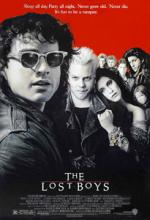In some ways, the entire world can be divided into two camps: those for whom "The Lost Boys" was (and is) a beloved and seminal film, and those who say "Corey who?"
I am in the first camp, in case you hadn't guessed, and I am saddened at the news of Corey Haim's death by apparent overdose. Haim was exactly the same age as I am, and I had always hoped that he - like me - would have a huge comeback some day. It could have happened! Look at Alec Baldwin, or Neil Patrick Harris! Or, closer to home, Keifer Sutherland.
All this talk of Corey Haim has me mulling over the unanswered (and perhaps unanswerable) question about "The Lost Boys." Is it a movie about the gay experience? Was Sam meant to be a gay teenager only starting to come to grips with his homosexuality?
Ample evidence exists on both sides. If you ask some people, "The Lost Boys" is officially a queer text. Others are shocked at the very insinuation, or startled into silently replaying the movies in their heads in super fast-forward before they respond.
"The Lost Boys" is a battlefield between those two colossi of academic debate: "It's all there in the text if you care to see it," and "you're just reading too much into it."
Here is what we know for sure: The movie was directed by Joel Schumacher, who is openly gay, although he wasn't out at the time he made "The Lost Boys." There is an undeniable chemistry between Kiefer Sutherland and Jason Patric. Homosexual chemistry, or "the regular kind"? (And what is the difference, where does that line get drawn?) The most obvious "clue" is that Corey Haim's character Sam has a poster of Rob Lowe on his bedroom wall, posing in an fashion that one could call "unusually seductive for a straight boy's room."
Although it's tempting to put Sam's wardrobe on the "gay" pile, one has to account for the fashions of the time. Which were, shall we say, considerably more colorful than today's fashionable youths. The same goes for the scene where Sam, taking a bubble bath, sings along to the radio in a falsetto. This can be chalked up to a bit of childish silliness.
The intensity of the relationship between Jason Patric and Kiefer Sutherland is mirrored by that of Corey Haim and Corey Feldman. Recall the early scene where Feldman stalks Haim through the aisles of the comic book store. Certainly Feldman's character is often intense, but doesn't it seem that there's something more going on there?
The smoldering gazes exchanged by the vampire and his intended prey/next immortal pal are part and parcel of the vampire genre. Following territory which had been amply blazed by Anne Rice's vampires by that time, "The Lost Boys" would have seemed odd if it hadn't included homosexual vampire subtext. (Or just plain "text.")
But surely the subtext between the vampire HUNTERS was unusual. In fact, I more often see the opposite - the super-straight vampire hunters defeating the gay vampire threat.
I am in the first camp, in case you hadn't guessed, and I am saddened at the news of Corey Haim's death by apparent overdose. Haim was exactly the same age as I am, and I had always hoped that he - like me - would have a huge comeback some day. It could have happened! Look at Alec Baldwin, or Neil Patrick Harris! Or, closer to home, Keifer Sutherland.
All this talk of Corey Haim has me mulling over the unanswered (and perhaps unanswerable) question about "The Lost Boys." Is it a movie about the gay experience? Was Sam meant to be a gay teenager only starting to come to grips with his homosexuality?
Ample evidence exists on both sides. If you ask some people, "The Lost Boys" is officially a queer text. Others are shocked at the very insinuation, or startled into silently replaying the movies in their heads in super fast-forward before they respond.
"The Lost Boys" is a battlefield between those two colossi of academic debate: "It's all there in the text if you care to see it," and "you're just reading too much into it."
Here is what we know for sure: The movie was directed by Joel Schumacher, who is openly gay, although he wasn't out at the time he made "The Lost Boys." There is an undeniable chemistry between Kiefer Sutherland and Jason Patric. Homosexual chemistry, or "the regular kind"? (And what is the difference, where does that line get drawn?) The most obvious "clue" is that Corey Haim's character Sam has a poster of Rob Lowe on his bedroom wall, posing in an fashion that one could call "unusually seductive for a straight boy's room."
Although it's tempting to put Sam's wardrobe on the "gay" pile, one has to account for the fashions of the time. Which were, shall we say, considerably more colorful than today's fashionable youths. The same goes for the scene where Sam, taking a bubble bath, sings along to the radio in a falsetto. This can be chalked up to a bit of childish silliness.
The intensity of the relationship between Jason Patric and Kiefer Sutherland is mirrored by that of Corey Haim and Corey Feldman. Recall the early scene where Feldman stalks Haim through the aisles of the comic book store. Certainly Feldman's character is often intense, but doesn't it seem that there's something more going on there?
The smoldering gazes exchanged by the vampire and his intended prey/next immortal pal are part and parcel of the vampire genre. Following territory which had been amply blazed by Anne Rice's vampires by that time, "The Lost Boys" would have seemed odd if it hadn't included homosexual vampire subtext. (Or just plain "text.")
But surely the subtext between the vampire HUNTERS was unusual. In fact, I more often see the opposite - the super-straight vampire hunters defeating the gay vampire threat.
